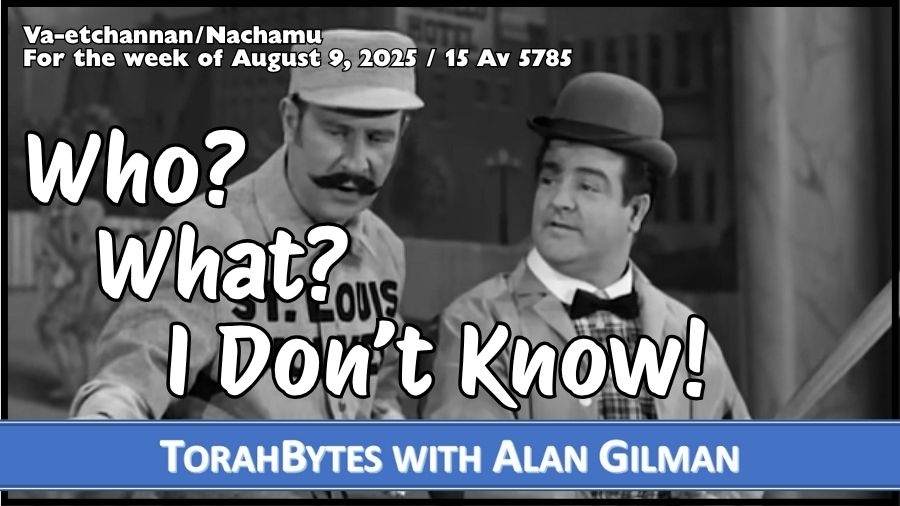
Va-etchannan/Nachamu
For the week of August 9, 2025 / 15 Av 5785
Torah D’varim/Deuteronomy 3:23 – 7:11
Haftarah: Isaiah 40:1-26
Hear, O Israel: The LORD our God, the LORD is one. (D’varim/Deuteronomy 6:4)
Perhaps the greatest comedy bit of all time is Who’s On First?, Abbot and Costello’s timeless routine of identity confusion. Now, you might be wondering, if not offended, that I would bring up a comedy sketch after quoting the Shema, one of the most key, not to mention sacred, of all Torah verses. In Jewish tradition, it is the first line of a thrice-daily prayer that continues through verse nine of D’varim/Deuteronomy chapter six, plus chapter eleven, verses thirteen through twenty-one, and B’midbar/Numbers, chapter fifteen, verses thirty-seven through forty-one.
However, there’s something relevant in Who’s On First?, as it provides a profound insight regarding communication in general and this ancient statement specifically. What makes Who’s On First? delightfully funny is that the confusion over the players’ names is understandable to the audience. Even though we know what’s going on, the supposed confusion borders on incredulity. The audience reacts with laughter, because we are privy to the joke.
The problem that the sketch playfully engages is the exaggeration of a common situation, where asking the wrong questions, especially having failed to understand the full context of something, leads to great misunderstanding. While the historical misunderstanding that has arisen over the Shema is no joke, it is interesting that it is due to confusing “who” with “what.”
You may not be aware that in Jewish history, the opening line of the Shema: Hear, O Israel: The LORD our God, the LORD is one (D’varim/Deuteronomy 6:4), became a statement of defiance. The reference to “one” became a retort to Christian trinitarianism, which the Jewish world took to be a pagan concept to be resisted at all costs. I am aware of attempts to find the concept of “complex unity” in the Hebrew word for “one” here, which is echad. And those arguments are worth considering to show that God never intended to instill in Israel unitarianism or absolute monotheism.
However, here’s where the traditional controversy gets into some, “Who, what, I don’t know” ala Abbot and Costello. It’s because the theological argument isn’t actually based on this scriptural statement. The Shema isn’t about what God is, but rather who God is. Moses wasn’t providing the people of Israel a defense against Christianity. Instead, he was calling the people to strict, exclusive allegiance to their God. The word echad, in this context, is about his being the only God. A better translation would be: “Hear O Israel, the LORD our God is the LORD alone.”
Tragically, in my opinion, historic Christianity has been more obsessed with what God is than who he is, despite the Bible’s being far more interested in “who” than “what.” But when the “what” became the question, the “who” became confused. Instead of a call to truth, the Shema became a misguided battle cry in a religious battle. And that’s not funny!
Scriptures taken from the English Standard Version
Thanks for educating me about this bit of the complicated history between Judaism and Christianity.
I appreciate your “who vs what” distinction.